AULA 01/2022 – Simple Past, Past Continuous and Colloquial - 19/01/2022
VAMOS INICIAR NOSSA AULA COM OS SEGUINTES TEMPOS VERBAIS
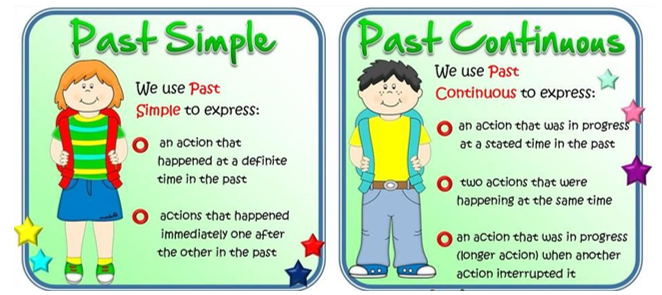
Disponível em: https://br.pinterest.com/pin/848858229734784069/ Acesso em 27 de out. de 2020.
| Quadro1: Usamos o passado simples para expressar: – uma ação que aconteceu em um tempo definido no passado; – ações que aconteceram imediatamente uma após a outra no passado. | Quadro 2: Usamos o passado contínuo para expressar: – uma ação que estava em andamento em um determinado momento no passado; – duas ações que estavam acontecendo ao mesmo tempo; – uma ação que estava em andamento (ação mais longa) quando outra ação a interrompeu. |
Examples:
Past simple:
- Sophia went to the park yesterday. Sofia foi ao parque ontem.
Past Continuous:
- Sophia was reading a book when Peter called her. Sofia estava lendo um livro, quando Peter a chamou.
Agora vamos conhecer as diferenças entre o modo formal e informal de fala na Língua Inglesa!!!
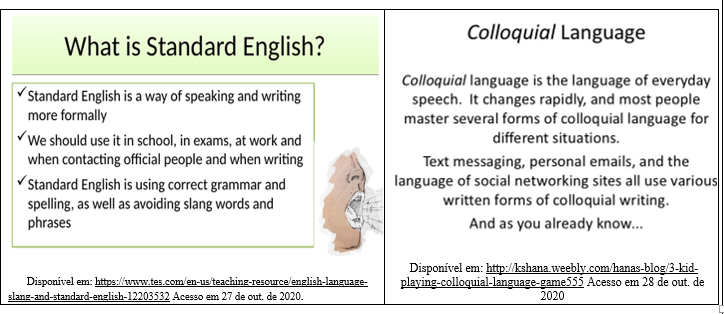
Disponível em: https://www.tes.com/en-us/teaching-resource/english-language-slang-and-standard-english-12203532 Acesso em 27 de out. de 2020.
Vamos às atividades!!!!

1. Choose the correct answer to complete the sentences. (Escolha a alternativa correta para completar as sentenças.)
I- _________________________ answered the teacher’s question.
a) ( ) The class
b) ( ) The student
c) ( ) Nancy
d) ( ) Daniel
II- ___________________________ was watching TV two days earlier.
a) ( ) The teacher
b) ( ) Nancy
c) ( ) The students
d) ( ) Daniel
Agora, vamos conhecer um pouco sobre Clara!
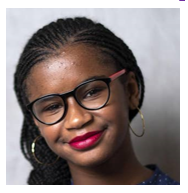
THINGS I DID LAST MONTH
Hello, everybody! I am Clara. I live in São Miguel do Araguaia. I am 12 years old. And I want to share with you the things I did last month. My mom and I were watching TV at night, when my father arrived at home. He was very happy because he decided to go camping with us. We travelled to Baliza. It took us 8 hours to get there. During the trip, we stopped a lot and we took lots of pictures of animals and plants. It was almost midnight when we arrived at the camping area. We visited some beautiful places. We swam in the river and we had lots of fun together. We spent 5 days there. It was amazing.
Figura disponível em https://www.independent.co.uk/life-style/women/international-day-of-the-girl-united-nations-what-is-it-jo-malone-girl-up-a8578551.html Acesso em 27 de out. de 2020.
2. All the sentences are wrong. Find the mistakes and correct them. (Todas as sentenças estão erradas. Encontre os erros e corrija-os.)
a) Clara moved to Baliza with her family last month.
b) Clara’s mother was very happy because they decided to go camping.
c) They arrived at the camping area in the morning.
3. Answer the questions below in English. (Responda às questões a seguir em inglês).
a) Where did Clara and her family travel?
b) How long did it take them to get to Baliza?
c) Did they stay at a hotel?
d) Did they like the trip?
4. Find the past tense forms of the verbs listed below in the puzzle and circle them. Then, choose 5 verbs and write sentences. (Encontre as formas do passado dos verbos listados abaixo no quebra-cabeça e circule-os. Em seguida, escolha 5 verbos e escreva frases.)
GO LIVE WANT SHARE SPEND
MOVE ARRIVE HAVE SWIM TAKE
DECIDE TRAVEL STOP EAT GIVE
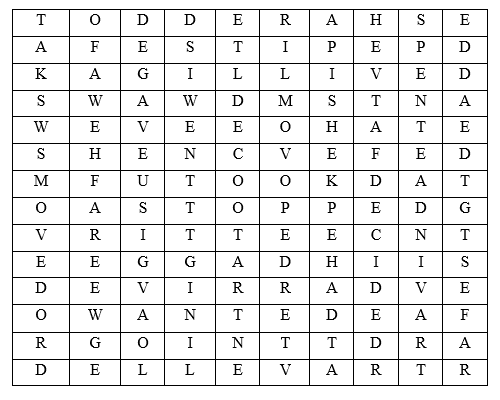
5. Read the cartoon and the notes below. Then, identify the reason why they can’t communicate. Answer in Portuguese. (Leia o cartum e as observações a seguir. Depois, identifique a razão pela qual eles não conseguem se comunicar. Resposta em Português)
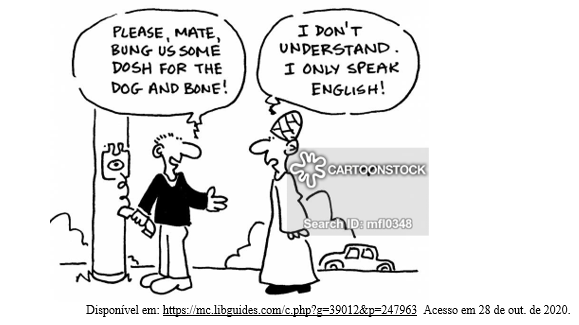
1. Mate (Australian/ British slang) a friend
2. Bung (British slang) to put, give or throw
3. Dosh (British slang) money
4. Dog and bone (British rhyming slang) telephone